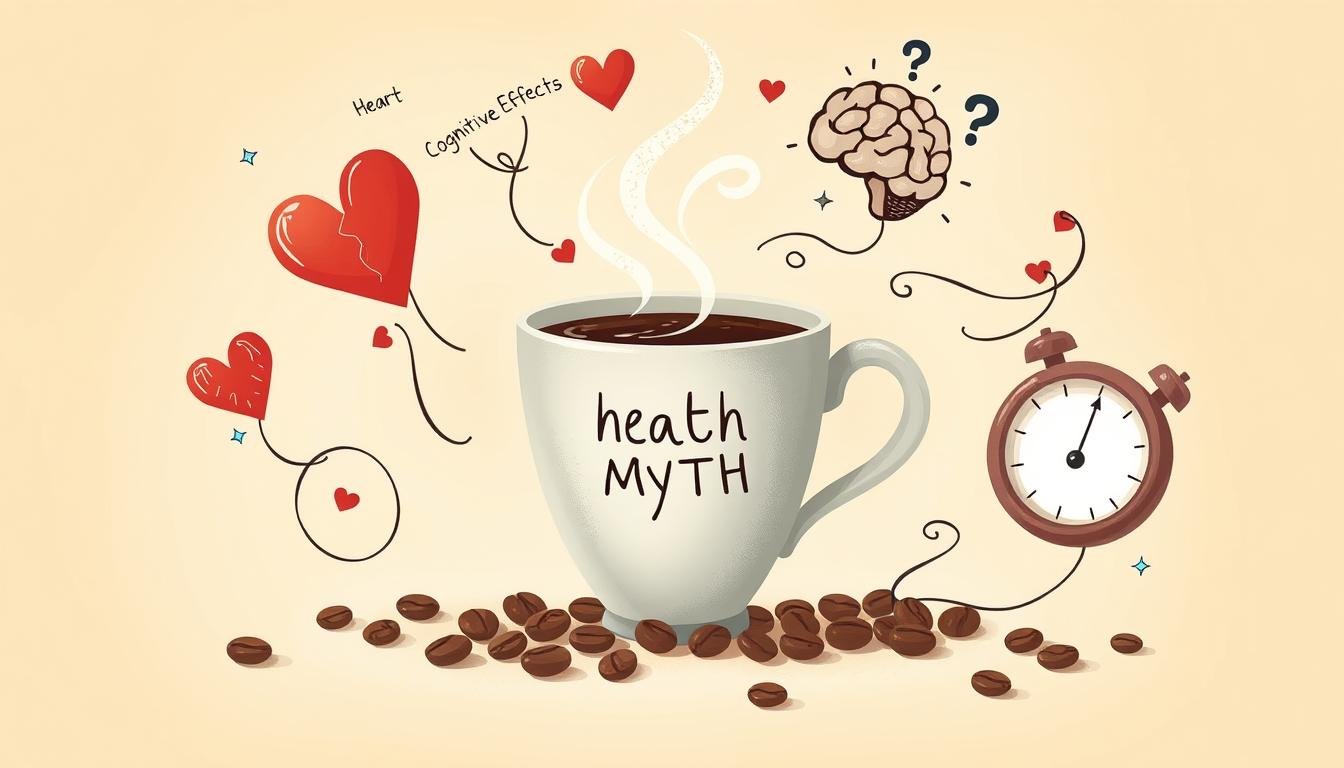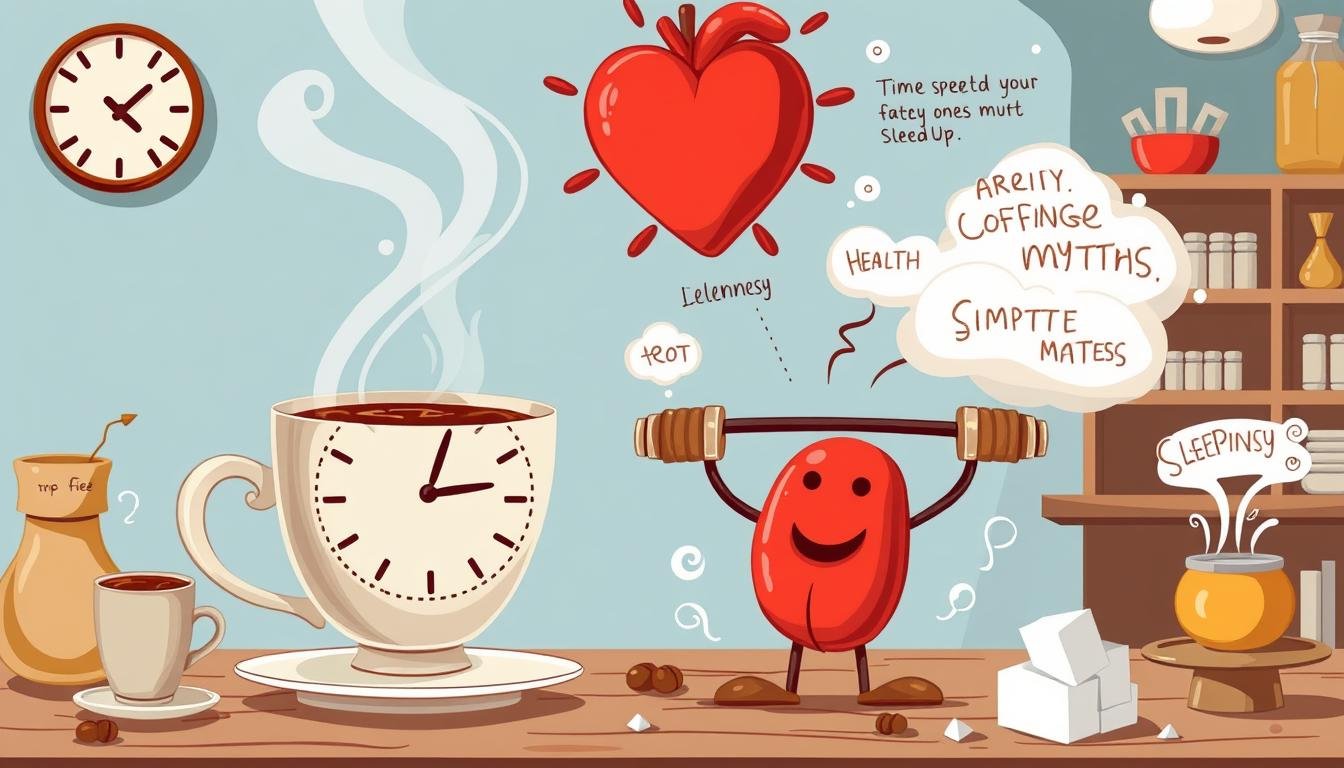I Uncover the Real Story on Coffee Health Myths

Did you know Americans drink 400 million cups of coffee every day? This shows how important coffee is in our lives. Coffee has faced many health myths and wrong ideas. In this article, I’ll look into these myths, find out what’s true, and share the latest research on coffee and health.
From its benefits for heart health to its impact on hydration and sleep, I’ll cover common myths. I aim to give you the facts so you can choose your coffee wisely.
Coffee might protect against diseases like Parkinson’s, Type 2 diabetes, liver disease, and heart attacks. But, drinking too much boiled, unfiltered coffee can slightly raise cholesterol levels. As we uncover the truth, we’ll see why drinking coffee in moderation is good for our health. This article is for anyone who loves coffee or wants to know more about its health effects.
Key Takeaways
- Coffee consumption may offer cardioprotection and aid in longevity
- Moderate coffee consumption is defined as 3-5 cups per day, corresponding to 285-475 milligrams of caffeine
- Coffee can provide around 11% of the recommended daily intake of Vitamin B2 per cup consumed
- Polyphenols found in coffee serve as antioxidants, protecting against inflammation, cancer, and heart diseases
- Regular coffee consumption may lower the risk of heart disease and stroke
- Coffee can be counted towards a person’s daily intake of fluids and does not necessarily lead to dehydration
Introduction to Coffee Health Myths
Coffee is a popular drink, but it’s surrounded by myths. These myths make even coffee lovers doubt its health benefits. It’s important to know the truth behind these myths and understand the facts.
Studies have shown that drinking coffee in moderation can be good for us. In fact, over 200 studies suggest that three to four cups a day can improve our health.
Some myths say coffee is unhealthy, can stunt growth, or cause insomnia. But, research shows coffee has many health benefits. It can lower the risk of depression and improve lung function.
It’s vital to rely on accurate information and expert opinions for our health. By knowing the truth about coffee, we can enjoy its benefits and improve our well-being.
Here are some key points to consider when evaluating the health effects of coffee:
- Coffee is rich in antioxidants, which can contribute to overall well-being and combat oxidative stress in the body.
- Regular, moderate coffee consumption may lower the risk of conditions like Parkinson’s disease, Alzheimer’s, and certain types of cancers.
- Caffeine in coffee has been linked to improved cognitive function, enhancing mood, concentration, and alertness.
By examining the common coffee misconceptions and understanding the benefits of drinking coffee, we can make informed choices about our coffee consumption and enjoy its positive effects on our health. It’s essential to separate coffee facts versus fiction and rely on accurate information to appreciate the value of moderate coffee consumption.
| Coffee Type | Caffeine Content |
|---|---|
| Classic drip coffee | 75-100 mg per 6-ounce cup |
| Espresso | 40 mg per 1 oz (single shot) |
| Black tea | 60-100 mg per 16 oz |
Common Misconceptions About Coffee Consumption

Exploring the world of coffee, I’ve found many myths. Two big ones are that coffee dehydrates you and causes heart problems. But what’s the real deal about coffee and health? Let’s look at the facts and clear up these myths.
Is coffee bad for you? The answer is not simple. The truth about coffee and health is complex. For example, the myth that coffee dehydrates you is not true. Coffee is mostly water, helping you stay hydrated.
“Coffee Dehydrates You”
This myth might come from caffeine’s mild diuretic effect. But coffee’s water content balances this out. So, drinking coffee in moderation can help with staying hydrated.
“Coffee Causes Heart Problems”
Another myth is that coffee harms the heart. While too much caffeine can raise heart rate and blood pressure, a little coffee is okay. It might even be good for your heart.
By looking at the facts and debunking myths, we can understand coffee’s health effects better. Whether you’re wondering if coffee is bad for you or just want the truth, it’s key to know the facts. This way, you can make smart choices about your coffee habit.
| Coffee Myth | Fact |
|---|---|
| Coffee dehydrates you | Coffee is 98% water and can contribute to daily hydration |
| Coffee causes heart problems | Moderate coffee consumption has neutral or positive effects on cardiovascular health |
The Impact of Caffeine on Health
Exploring caffeine’s effects on health reveals its complex nature. Expert opinions on coffee consumption highlight its potential benefits. Coffee and health facts indicate that moderate drinking may lower heart disease risk.
The benefits of drinking coffee are clear, but too much caffeine can be harmful. Too much caffeine can make you feel jittery, your heart race, and cause nausea. To stay safe, limit your caffeine to 400 mg daily.
- Adults: 400 mg or less
- Pregnant or breastfeeding women: 300 mg or less
- Children under 18: 2.5 mg per kilogram of body weight or less
| Caffeine Source | Caffeine Content (mg) |
|---|---|
| Brewed or percolated coffee (1 cup) | 118-135 |
| Energy shot (60 mL) | 210 |
| Black tea (1 cup) | 50 |
| Green tea (1 cup) | 30 |
| Decaf coffee (1 cup) | 3 |
Understanding Caffeine Tolerance
Caffeine tolerance varies widely among individuals. Some are very sensitive, while others can handle more without issues.
Does Caffeine Lead to Anxiety?
Research suggests that too much caffeine can increase anxiety in some. Yet, moderate coffee drinking is generally safe. It may even boost brain function and lower disease risk.
Coffee and Weight Management

Coffee has sparked many coffee health myths about weight management. It’s key to know the truth and debunk the myths that confuse people.
Studies show that drinking coffee in moderation can help with weight. For example, one study found that a daily cup of coffee led to a 0.12 kg weight loss over four years. This effect was more noticeable in people with higher BMI and younger age.
Can Coffee Help with Weight Loss?
Coffee itself has very few calories, just 2 per 240 ml cup. But adding sugar, cream, or other high-calorie items can undo its weight loss benefits. Despite common coffee misconceptions, research supports that moderate coffee drinking can aid in weight management.
The Role of Coffee in Appetite Control
Coffee might also help control appetite by reducing daily calorie intake. Adding coffee to a diet can make it easier to follow a meal plan and avoid overeating. It’s important to trust scientific evidence when considering coffee’s role in weight management.
Coffee’s Role in Disease Prevention
Exploring coffee’s link to health is key. It’s vital to look at how coffee helps prevent diseases. Drinking coffee in moderation might lower the risk of type 2 diabetes and some cancers. Coffee facts versus fiction can confuse us, but studies show coffee can be good for our health.
Research finds that drinking coffee can lower type 2 diabetes risk by 11%. It also reduces metabolic syndrome risk. Drinking two to three cups daily can cut liver cancer and chronic liver disease risks by 38% and 46%, respectively. When we ask is coffee bad for you, we must consider both sides.
- A 2017 meta-analysis found that drinking four to six cups daily lowers metabolic syndrome and type 2 diabetes risk.
- Men who drank over four cups daily had a fivefold lower Parkinson’s disease risk.
- Drinking three to five cups daily may reduce cardiovascular disease risk by 15%.
In summary, while too much coffee can be risky, moderate drinking has clear benefits. By knowing the coffee facts versus fiction and being mindful, we can enjoy coffee’s health perks. This way, we make smart choices about our daily habits.
Myths Related to Coffee and Sleep

Exploring coffee myths, I find it interesting to look at coffee and sleep. Many think we should avoid coffee at night. But, experts say caffeine’s effect on sleep varies by person and amount.
While caffeine can mess with sleep, it doesn’t mean we must give up coffee. In fact, a little coffee each day can be good for us. To drink coffee without affecting sleep, knowing caffeine’s half-life is key.
Understanding Caffeine’s Half-Life
Caffeine’s peak is within six hours, and it lasts about five to six hours in our system. This means afternoon coffee might still be in our system at night. But, timing our coffee can help avoid sleep issues.
Looking into coffee myths, it’s important to listen to experts and health facts. This way, we can enjoy coffee wisely and sleep well.
Separating Fact from Fiction
Let’s look at the facts. Two-thirds of Americans drink coffee daily, and TikTok has millions of coffee posts. This shows coffee’s big role in our lives. By understanding myths, expert views, and health facts, we can choose wisely about coffee and our health.
| Coffee Consumption | Recommended Daily Intake | Effects on Sleep |
|---|---|---|
| 1-2 cups | 200-400mg of caffeine | Minimal impact on sleep |
| 3-4 cups | 400-600mg of caffeine | Potential disruption of sleep patterns |
The Effects of Coffee on Mental Health
Coffee has been studied for its effects on mental health, showing some promising results. We need to look at how coffee affects mood and brain function. It’s important to know the truth and debunk myths about coffee’s health effects.
Studies show that drinking 3-5 cups of coffee a day might improve mood and brain function. But, everyone reacts differently, and too much caffeine can be harmful. Drinking coffee in moderation can have big benefits, and understanding the science behind it helps us make better choices.
Some key benefits of drinking coffee in moderation include:
- Improved mood and reduced risk of depression
- Enhanced cognitive function and alertness
- Potential neuroprotective effects and reduced risk of certain neurodegenerative diseases
As we learn more about coffee’s effects on mental health, it’s important to ignore debunked myths. By focusing on the good effects of moderate coffee drinking and being aware of our caffeine sensitivity, we can enjoy coffee’s benefits for our mental health.
The relationship between coffee and mental health is complex, and more research is needed. But, by knowing the truth and enjoying coffee in moderation, we can make better choices. This can lead to a healthier, happier life.
| Coffee Type | Caffeine Content |
|---|---|
| Brewed Coffee (8 oz) | 95 mg |
| Espresso (1 shot) | 65 mg |
| Decaf Coffee (8 oz) | 4 mg |
Coffee Quality and Health Implications

Many people are confused about coffee’s health effects. This confusion comes from common coffee misconceptions. The quality of coffee beans is key. Fresh beans can greatly improve taste and nutrition.
Some ask is coffee bad for you? The answer varies based on coffee type and amount. Drinking 3-5 cups a day can be good for you. It may even lower stroke and heart disease risks by 20-21% compared to those who don’t drink coffee. For more info, visit the blog.cafecampesino.com website.
The Importance of Fresh Coffee Beans
Fresh coffee beans are crucial for a great cup. They have more antioxidants and taste better than stale beans. Choose a trusted brand for the best coffee.
Organic vs. Non-Organic Coffee: Is There a Difference?
Organic and non-organic coffee differ in farming methods and pesticide use. Organic coffee avoids synthetic pesticides, which is better for the planet and health. Yet, the choice between organic and non-organic coffee depends on personal values.
| Coffee Type | Characteristics |
|---|---|
| Organic Coffee | Grown without synthetic pesticides, better for the environment and human health |
| Non-Organic Coffee | May contain synthetic pesticides, potentially harmful to the environment and human health |
Misunderstood Health Benefits of Coffee
Exploring coffee, I found many health benefits. Experts say moderate coffee drinking is good for us. It can improve our health in many ways, like antioxidants and possibly even help us live longer.
Coffee is full of antioxidants, which fight cell damage and lower disease risk. Studies show coffee has many healthy compounds.
Antioxidants in Coffee
Coffee is packed with antioxidants. These protect cells and lower disease risk, like heart disease and cancer. Drinking coffee in moderation is safer than the risks.
Coffee and Longevity Research
Research links moderate coffee drinking to a longer life. The exact reasons are still being studied. But, coffee’s antioxidants and compounds might boost health and longevity. Experts agree coffee is good for a healthy lifestyle.
Conclusion: Debunking Coffee Health Myths
The truth about coffee’s health effects is more complex than myths suggest. Understanding coffee’s science helps us make better choices about drinking it.
Encouraging Informed Choices
Don’t rely on old rumors or unproven claims about coffee. Instead, look at the research on its benefits and risks. This research shows coffee can be good for us in many ways.
Final Thoughts on Coffee and Health
While it’s important to drink coffee in moderation, the research supports its role in a healthy lifestyle. By making informed choices, you can enjoy coffee’s benefits without falling for coffee health myths. Remember, a healthier you often starts with knowledge.